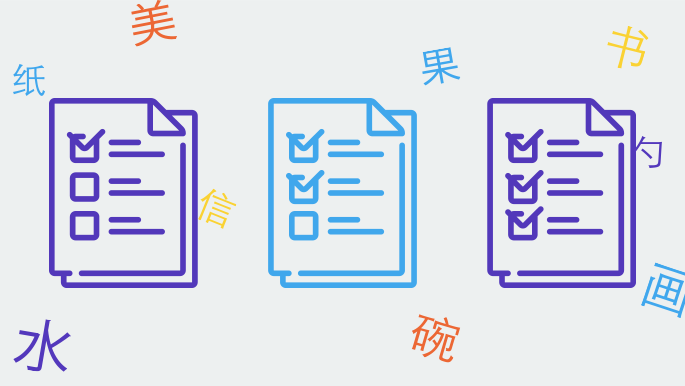
Everything About the HSK Test From A to Z
HSK in brief:
The HSK test (Hànyǔ Shuǐpíng Kǎoshì), is a standardized Chinese language proficiency test for non-native speakers established by China. This test is divided into different levels, each of which represents a certain level of fluency in Chinese Mandarin. The HSK is administered by Hanban, which is an agency within the Ministry of Education of the People’s Republic of China.
An HSK certificate is valid throughout China, and is often used to prove language proficiency in higher education and professional areas. The test is only administered in Chinese Mandarin with simplified Chinese Mandarin characters. That said, if paper-based, an HSK test taker may use traditional characters as well. However, the computer-based test does not offer that option.
What the HSK can do for you
The HSK is not necessary for everyone, however, it is considered a good way to prove proficiency in Mandarin Chinese, especially as a student or professional. Not everyone in China knows about the HSK or requires it for job applications, however, some do.
Generally speaking, having HSK credentials opens up a wider range of opportunities for work in various fields. In some instances, a high HSK certification can be considered more important than other education, such as a bachelor’s degree. This sometimes occurs when a job specifically requires strong Chinese Mandarin language skills above all else. Many universities use it as a prerequisite for foreign student admission, and certain scholarships can also be applied to with HSK test results, such as the Confucius Institute Scholarship.
Current HSK test structure and format
The most recent HSK test version aims to test comprehensive language and communication ability. The test consists of both a written and an oral part, which are taken separately. The HSK test is divided into 6 levels, level 6 representing the highest Chinese Mandarin proficiency.
| Level | Vocabulary | Characters | Listening | Reading | Writing | ||
| All | New | All | New | ||||
| 1 | 150 | 150 | 174 | 174 | 20 questions in 15 min | 20 questions in 17 min |
|
| 2 | 300 | 150 | 347 | 173 | 35 questions, 25 min | 25 questions, 22 min |
|
| 3 | 600 | 300 | 617 | 270 | 40 questions | 30 questions | 10 items |
| 4 | 1200 | 600 | 1064 | 447 | 45 questions | 40 questions | 15 items |
| 5 | 2500 | 1300 | 1685 | 621 | 45 questions | 45 questions | 10 items |
| 6 | 5000 | 2500 | 2663 | 978 | 50 questions | 50 questions | 1 composition |
HSK 1:
The first level is designed for learners who can understand and use simple Chinese Mandarin characters and Chinese Mandarin sentences to communicate. In the HSK 1 test, all characters are provided with their Pinyin.
HSK 2:
The second level is made for learners who can use Chinese Mandarin in a simple and direct manner, applying it in a basic fashion to their daily lives. Characters in the HSK 2 test are also provided with Pinyin.
HSK 3:
The third level is for learners who can use Chinese to serve the demands of their personal lives, studies, and work.
HSK 4:
The fourth level is for learners who can discuss a relatively wide range of topics in Chinese and are capable of communicating well with other Chinese Mandarin speakers.
HSK 5:
The fifth level is for learners who can read Chinese Mandarin newspapers and magazines, watch Chinese Mandarin films, and are capable of writing and delivering speeches in Chinese Mandarin.
HSK 6:
The sixth level is for Chinese Mandarin learners who can easily understand any information communicated in Chinese Mandarin and are capable of smoothly expressing themselves in written and oral form. This level represents the most capable fluency in the language.
A level is considered successfully passed if a test taker can score 60% or above cumulatively. Each section (listening, reading, and writing) is scored on a 100 point scale. Therefore, in an HSK 5 test, if a test taker were to score a 0 on the listening section, but a 90 on both the reading and writing sections, they would acquire HSK 5 certification.
The HSK oral exam, also called the HSKK:
In addition to the listening, reading, and writing sections, the oral section is also required. This section is given separately and can be thought of as a separate test. The oral test, often referred to as the HSKK test, is an extension of the HSK with 6 levels, each corresponding to an HSK level. These tests are also out a 100 points, and testers must earn 60% or greater to pass and gain certification.
| HSK level | HSKK level | ECR | Words | Questions | Minutes |
| 1 | Beginner | A | 200 | 27 | 17 |
| 2 | |||||
| 3 | Intermediate | B | 900 | 14 | 21 |
| 4 | |||||
| 5 | Advanced | C | 3000 | 6 | 24 |
| 6 |
Where to take the HSK:
To sign up and register for the HSK and HSKK tests, go to chinesetest.cn. There, you can go to “Test Registration” at the top of the page and can select a test center and date. Different test centers may be available depending on whether or not you prefer to take the test online or in written form. Regardless of whether you take the test online or not, it still needs to be taking at a test center.
Timeline for the HSK
Dates for when test results are delivered are also listed on the website on the same page as the exam dates. Usually, results are announced about a month after the tests are taken. If you want a physical HSK certificate, you must contact the test center to make the enquiry.
All tests are graded at the HSK headquarters in Beijing, and therefore, it can sometimes take a while for results to come in depending on the location where the test was taken.
Retaking the HSK test
You can retake the HSK tests as many times as you wish, therefore, failure does not impede you from attempting again in the future.
HSK costs
Test takers taking the HSK are required to pay a fee. This fee may change depending on the time you are reading this article and potentially depending on the test center you plan to take the test at. Best practices are to verify costs with the test center ahead of time. A rule of thumb, however, is that higher levels cost more. In the US, one test center had costs ranging from $20 (HSK 1) to $70 (HSK 6).
HSK test’s validity over time:
HSK certificates are valid indefinitely, however, certain institutions may not except certifications that were acquired before a certain date. Therefore, it is best to make sure that your current HSK certificate is valid for the specific purpose you wish to use it for if you already have an HSK certificate. Chinese universities sometimes have a two-year expiration policy for example.
Preparing for the tests
Specifically preparing for the HSK can help boost a test takers ability to perform well on the test. The following are a few tips and insights given by school teachers who help people prepare for the test:
1 – Know the words list
Each level has a standard list of words that the test taker needs to know. Therefore, if you know what words you need to know and study them properly, you give yourself a good opportunity to perform well. Words on the list will appear throughout the listening and reading parts of the exam while using such words in the writing section can help improve your score. Questions are likely to target the list of words that the tester is expected to know, therefore, understanding those words can makeup for when other words or nuances are not understood during the test.
2 – Speed
As you reach the higher HSK levels (4 and higher), reading the whole text in the reading part can cost you too much time. Due to the time limits and the text length, there is not enough time to catch every little detail in the text. However, you do not need to catch all those details to successfully complete the test. Some test-takers even perform better when they read the questions before they read the text.
To see if that strategy works for you, try it first on a practice test. While you are practicing, it is ideal to keep a timer so you can get a feel for how much time it takes you to get through the section. Instead of simply going through and answering the questions, it is best to be strategic about how you approach the questions depending on how much time is remaining for the section.
3 – Practice
HSK tests follow a very rigid structure with minimal variations on covered topics. Therefore, practice tests are usually good representations of the actual tests. With that in mind, practicing can have a very positive impact on performance. If you take enough practice tests, you are likely to encounter all the vocabulary, characters, and grammar that will come around when you take a real test. In some ways, although HSK test scores reflect a certain level of proficiency, it also can reflect a test taker’s test preparation.
4 – Try to get ahead
Don’t be passive. Look through any questions in the listening part before the recording starts if possible. Briefly looking through the questions helps you look for what you need to know during the recording and therefore can help boost a test taker’s performance. For example, if a question targets price, you will know you need to be looking out for pricing when the recording starts.
5 – Improve your overall proficiency in Chinese Mandarin
Although test preparation can go a long way, the greatest way to improve your ability to perform on the HSK is to improve your overall proficiency. If you understand and can read Chinese Mandarin better in general, that ability will translate to the HSK.
The HSK is not a particularly difficult test to pass if a test taker has the necessary language proficiency and has prepared ahead of time. That said, jumping in over your head and taking the test without preparation and inadequate fluency will result in the test becoming rather difficult.
See more:
- What You Should Know about The New 3.0 HSK Test.
- HSK Test Preparation: A Basic Guide.
Old Vs. new test HSK tests
Prior to 2010, the HSK test followed a different structure and format. This article focuses on the current test.
This article is courtesy of Pandanese, an online learning website that teaches Chinese using SRS and neuroscience techniques to speed up the learning process and render it more manageable.
You can visit Pandanese at www.pandanese.com
The easiest way to learn Chinese & build vocabulary

